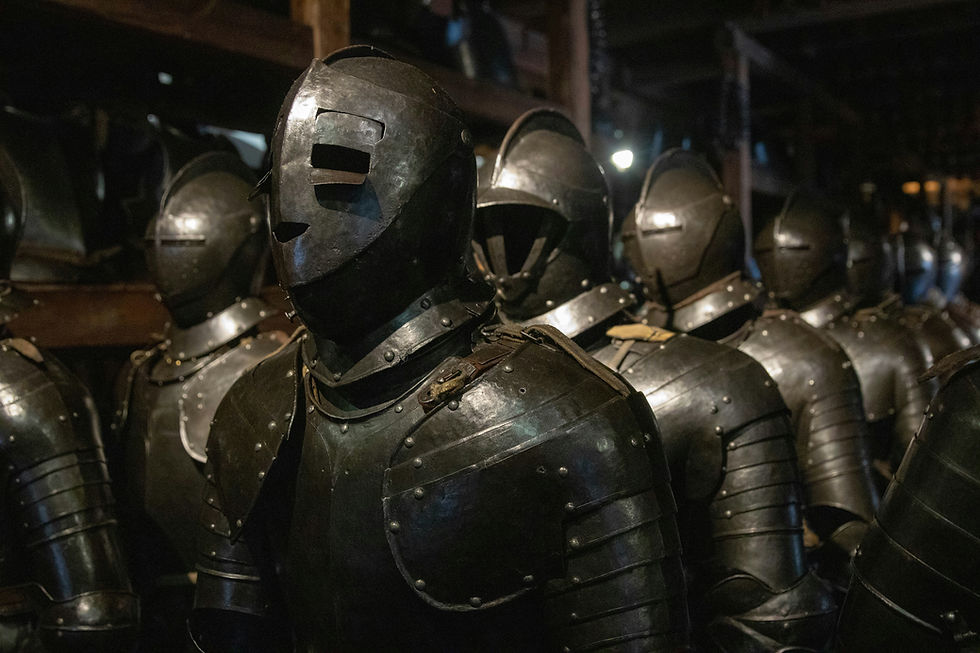Lord I Lift Your Name on High
- Brian Doyle

- Nov 10, 2022
- 4 min read
The other night, as I was waiting to speak to a conference of preachers overseas, a friend who recently moved to South Dakota and I were talking (I had asked him for prayer), and the subject of the Gospel symbols I use in many of my posts came up. He said “you’re using the ‘Lift Your Name on High’ Symbols, can I use them too?” To which I responded “Absolutely! It’s meant to be used by every believer!” It got me thinking about that simple song we’d sing in Youth Group: “Lord I lift your name on high, Lord I love to sing your praises, I’m so glad you’re in my life, I’m so glad you came to save us. You came from heaven to earth, to show the way, from the earth to cross, my debt to pay, from the cross to the grave, from the grave to the sky, Lord I lift your name on High.” And that’s it, a simple song, about the simplicity of the Gospel.
And the Gospel is that simple. We were dead in our sins, Jesus came and lived the life we could not, and died on the cross, rescuing us from sin and also from death when He rose from the grave 3 days later. He is alive, now at the right hand of the Father, and He’s returning some day. That’s the Gospel! That’s how simple it is! That is something every believer in Christ, in spite of denominational differences should be able to stand together on! Our congregation is a melting pot of backgrounds: Methodist, Pentecostal, Baptist, Lutheran, Catholic, and so many others besides, and why? Because we stand together in the Gospel of Jesus Christ and the preaching of His word. We are proof that Christians can set aside differences of opinion and get to work, together for the sake of the simplicity of the Gospel.
We exist to glorify God, and cannot apart from what Christ did on the Cross. All the minor doctrinal differences can be set aside for the work of the Gospel, as long as we’re standing on the Scriptures and grace through faith. The Church exists as the Bride of Christ. We’re here to tell others about Him. Everything else is incidental. Glorify God, spread the Gospel, Lift the Lord’s name on High.
1 Corinthians 15:1-28
Now I would remind you, brothers, of the gospel I preached to you, which you received, in which you stand, and by which you are being saved, if you hold fast to the word I preached to you—unless you believed in vain.
For I delivered to you as of first importance what I also received: that Christ died for our sins in accordance with the Scriptures, that he was buried, that he was raised on the third day in accordance with the Scriptures, and that he appeared to Cephas, then to the twelve. Then he appeared to more than five hundred brothers at one time, most of whom are still alive, though some have fallen asleep. Then he appeared to James, then to all the apostles. Last of all, as to one untimely born, he appeared also to me. For I am the least of the apostles, unworthy to be called an apostle, because I persecuted the church of God. But by the grace of God I am what I am, and his grace toward me was not in vain. On the contrary, I worked harder than any of them, though it was not I, but the grace of God that is with me. Whether then it was I or they, so we preach and so you believed.
Now if Christ is proclaimed as raised from the dead, how can some of you say that there is no resurrection of the dead? But if there is no resurrection of the dead, then not even Christ has been raised. And if Christ has not been raised, then our preaching is in vain and your faith is in vain. We are even found to be misrepresenting God, because we testified about God that he raised Christ, whom he did not raise if it is true that the dead are not raised. For if the dead are not raised, not even Christ has been raised. And if Christ has not been raised, your faith is futile and you are still in your sins. Then those also who have fallen asleep in Christ have perished. If in Christ we have hope in this life only, we are of all people most to be pitied.
But in fact Christ has been raised from the dead, the firstfruits of those who have fallen asleep. For as by a man came death, by a man has come also the resurrection of the dead. For as in Adam all die, so also in Christ shall all be made alive. But each in his own order: Christ the firstfruits, then at his coming those who belong to Christ. Then comes the end, when he delivers the kingdom to God the Father after destroying every rule and every authority and power. For he must reign until he has put all his enemies under his feet. The last enemy to be destroyed is death. For “God has put all things in subjection under his feet.” But when it says, “all things are put in subjection,” it is plain that he is excepted who put all things in subjection under him. When all things are subjected to him, then the Son himself will also be subjected to him who put all things in subjection under him, that God may be all in all.










Comments